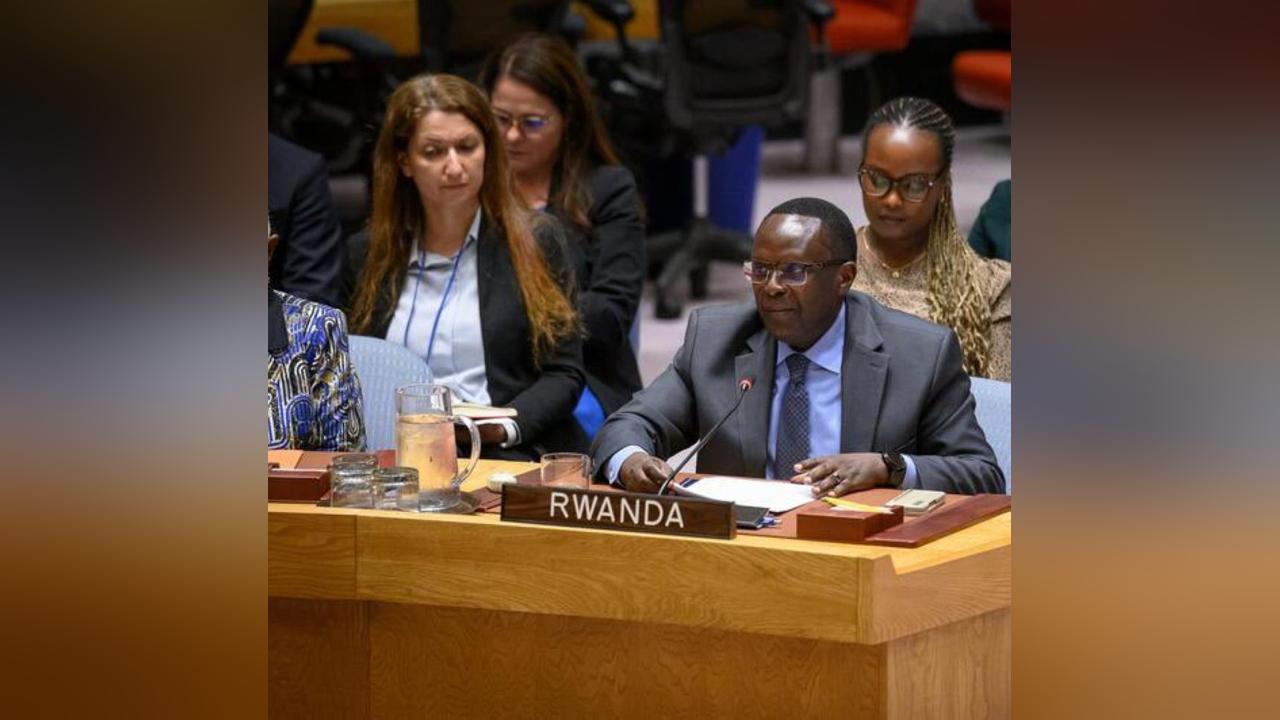Africa-Press – Rwanda. Rwanda’s UN Permanent Representative, Ambassador Martin Ngoga, has challenged emerging reports by the United Nations and other affiliated agencies that allege Rwanda’s involvement in civilian killings in eastern DR Congo.
Addressing the UN Security Council on Friday, August 22, on the security situation in eastern DR Congo, Ambassador Ngoga dismissed claims suggesting that Rwanda Defence Forces (RDF) aided the AFC/M23 in alleged targeting of civilians.
The joint report released on August 6 by the Office of the UN High Commissioner for Human Rights (OHCHR) and the UN Joint Human Rights Office (UNJHRO) alleged that the AFC/M23, ‘supported by RDF’, killed 319 civilians and injured an additional 169 across four villages in Rutsuru, North Kivu Province, between July 9 and 21. The report asserted that the victims were predominantly “Hutu farmers.”
Ambassador Ngoga questioned the credibility of these reports, highlighting their lack of evidence and the problematic ethnic labeling of the victims.
“On the alleged massacre of civilians, the initial reporting of facts has been contradictory, vague, and in many respects outright implausible. Only an impartial and independent investigation can provide the Council with a reliable set of facts to consider,” he said, emphasizing that the stance he proposed does not undermine UN reporting channels but defends their credibility.
Ngoga criticized the identification of alleged victims by ethnicity.
“The reports say the information was obtained via phone and satellite. Was the verification of ethnicity also established by phone and satellite?” he asked. “The Council is falling into the trap of further ethicizing the situation in eastern DR Congo.”
He called for rigorous investigations and direct engagement with sources cited by the UN reports.
“There is no information before the Council on who these victims are or how their ethnicity was established. These are fundamental questions the Council must ask.” Ngoga asserted.
He warned for such reports to emerge at politically sensitive moments, such as the current period of preparations for renewed negotiations in Doha and the initial implementation of the Washington-facilitated peace agreement, which includes the neutralization of DR Congo-backed FDLR.
“This group remains the principal driver of conflict, violence, and human rights abuses in eastern DR Congo,” Ngoga stated. “Selectivity undermines the credibility of UN reports and the pursuit of genuine accountability.”
The Ambassador expressed Rwanda’s concern over the risks of misinformation and selective reporting, even by actors expected to uphold the highest professional standards.
“We are particularly concerned by the longstanding pattern of selective reporting of human rights matters in DR Congo, where victims are portrayed as perpetrators and vice versa,” he said.
“While there has been overwhelming focus on alleged violations by AFC/M23, the UN and other actors have consistently neglected the documented atrocities committed against civilians in Minembwe, South Kivu, Nturo in Masisi, and Ituri, including drone strikes in civilian areas, which contravene international humanitarian law.”
Ngoga also highlighted the dangers of arbitrary arrests and mass detentions based on ethnicity, public humiliation, targeting of specific communities, and the propagation of dehumanizing rhetoric in schools and places of worship in DR Congo.
He further voiced concern over repeated ceasefire violations by Congolese forces and their allies, including Wazalendo units and the DR Congo-backed FDLR, citing credible reports of new military buildups in Uvira and other regions.
These violations contradict the permanent ceasefire, a key principle agreed upon by Kinshasa and AFC/M23 to end protracted conflicts in eastern DR Congo.
Ambassador Ngoga argued that such actions undermine the Congolese government’s good faith commitment to the peace process, yet, the Doha agreement between DR Congo and AFC/M23, alongside the Washington-facilitated Rwanda-DR Congo talks constitutes one of the two major avenues toward conflict resolution in the region.
Ngoga also criticized the UN’s selective language, which downplays the role of the DR Congo-backed FDLR.
“The term ‘Rwanda-backed M23’ is commonly used in reports and presentations, while the FDLR, which is backed by Kinshasa, is largely ignored,” he remarked.
“Do you lack evidence, even within your own reports, that Kinshasa supports the FDLR? Why not present it for what it is? The question of the FDLR is treated as a mere afterthought. That is not right. It is central to the problem in DR Congo and must be treated as such.”
Ambassador Ngoga also expressed disappointment that DR Congo did not consent to launch operations to neutralize the Kinshasa-backed FDLR during the first meeting of the joint security coordination mechanism on August 7. He reaffirmed Rwanda’s commitment to cooperate in conducting reliable investigations into humanitarian crises in DR Congo and to support ongoing peace process efforts.
For More News And Analysis About Rwanda Follow Africa-Press






